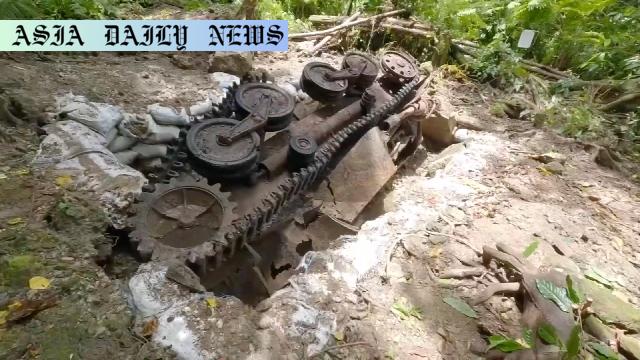Remains: The apparent remains of Japanese people believed to have died in World War Two have been newly found in a mass burial site on Palau’s Peleliu Island in the Pacific.

WWII Discoveries After Eight Decades
The Pacific island of Palau has recently revealed a haunting chapter from history with the discovery of a mass grave containing the apparent remains of Japanese soldiers who perished in one of the fiercest battles of World War II. This monumental unearthing on Peleliu Island hints at the vast scale of human loss, as it is believed the grave contains the remains of approximately 1,086 soldiers who died during the bloody conflict that took place in 1944. At that time, the US forces clashed with the Japanese Imperial military in a battle that wiped out over 10,000 Japanese, while leaving thousands more injured or missing.
The Unfolding Process of Discovery and Recovery
The discovery was made by officials from the Japan Association for Recovery and Repatriation of War Casualties, an organization commissioned by the Japanese government. Their task involves collecting samples from the unearthed remains, followed by DNA testing to confirm their authenticity and identity as Japanese soldiers. After verification, the bodies will find a somber journey back to their homeland, bringing a sense of closure to families who have long awaited news of their loved ones.
A Personal and National Tribute
For individuals like Kido Toshiko, whose father is among the many lost soldiers, the discovery stirs a complex wave of emotions. Toshiko remarked how the arrangement of bodies “simply piled up” underscores the brutal conditions under which these soldiers likely met their end. Such scenes reinforce the association’s drive to gather as many remains as possible, according to Takada Akihito, the head of the recovery delegation. Akihito passionately stated, “I want to tell the deceased we’ve finally come to bring them back”—a sentiment shared deeply by members of his team.
The Continuing Effort for Historical Reconciliation
With work expected to continue on Peleliu Island until May 24, this discovery not only offers closure for bereaved families but also highlights the lasting impact of World War II. The mass grave serves as a chilling reminder of the horrors of war and the profound human cost it incurs. It also reflects ongoing problems with the identification and repatriation process, as decades have passed since the conflict. Advancements in technology, such as DNA testing, have become a crucial tool for resolving such historical tasks, ensuring that the deceased receive the dignity they were denied in wartime.
A Broader Significance
This find is not merely about recovering bones but also uncovering stories. Each soldier unearthed represents thousands of untold stories of resilience, hardship, and sacrifice. It reinforces the importance of historical preservation and the need for peaceful relations between nations. This tragic yet important rediscovery marks a step toward honoring those lost to history, bridging the past with the present, and offering closure to families who have carried this burden for decades.
Commentary
Reflections on the Pain of War
The discovery of the WWII mass grave in Palau underscores the devastating human cost of conflict. While wars end, their shadows linger, as evidenced by the unearthing of over 1,000 Japanese soldiers’ remains. It serves as a stark reminder that loss reverberates across generations. Whether we view this discovery as a victory in reclamation or a somber acknowledgment of life’s fragility, it points us toward a historical reckoning of the events that shaped our modern world.
The Emotional Weight of Rediscovering History
For decades, families like Toshiko Kido’s have held out hope for closure, and this recent development awakens long-suppressed emotions. To unearth one’s own father from an unmarked grave is a bittersweet moment, filled with grief over the harsh realities of war yet tempered by relief at finally knowing where he rests. Kido’s words resonate deeply, as they illustrate how deeply the past continues to affect those living in the present.
A Call for Continued Efforts in Historical Preservation
This discovery places an immense responsibility on efforts like those undertaken by the Japan Association for Recovery and Repatriation of War Casualties. These teams are not merely recovering remains; they are preserving history, fostering healing, and reinforcing the significance of peace. The resilience and dedication of these individuals are admirable, and their work serves as a bridge between nations, reminding societies of the importance of remembering and learning from the past.


